North Macedonia - MK - MKD - MKD - Europe
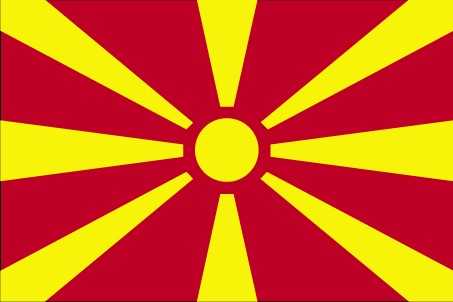
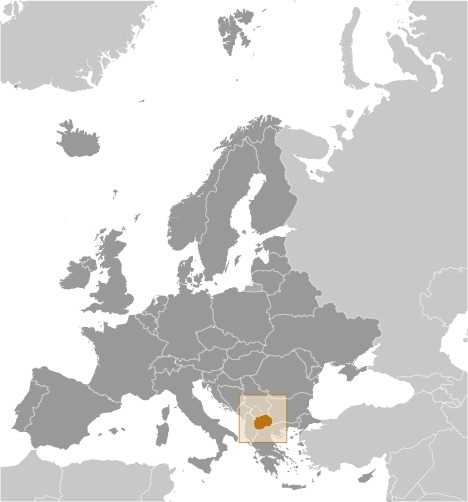
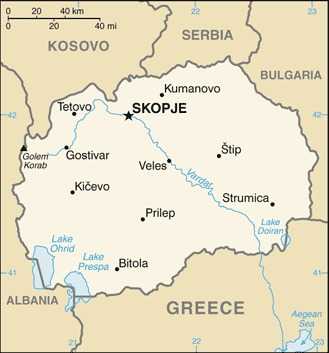
North Macedonia Images
North Macedonia Factbook Data
Diplomatic representation from the US
embassy: Str. Samoilova, Nr. 21, 1000 Skopje
mailing address: 7120 Skopje Place, Washington, DC 20521-7120
telephone: [389] (2) 310-2000
FAX: [389] (2) 310-2499
email address and website:
SkopjeACS@state.gov
https://mk.usembassy.gov/
Age structure
15-64 years: 68.4% (male 740,649/female 719,627)
65 years and over: 15.6% (2024 est.) (male 147,655/female 186,323)
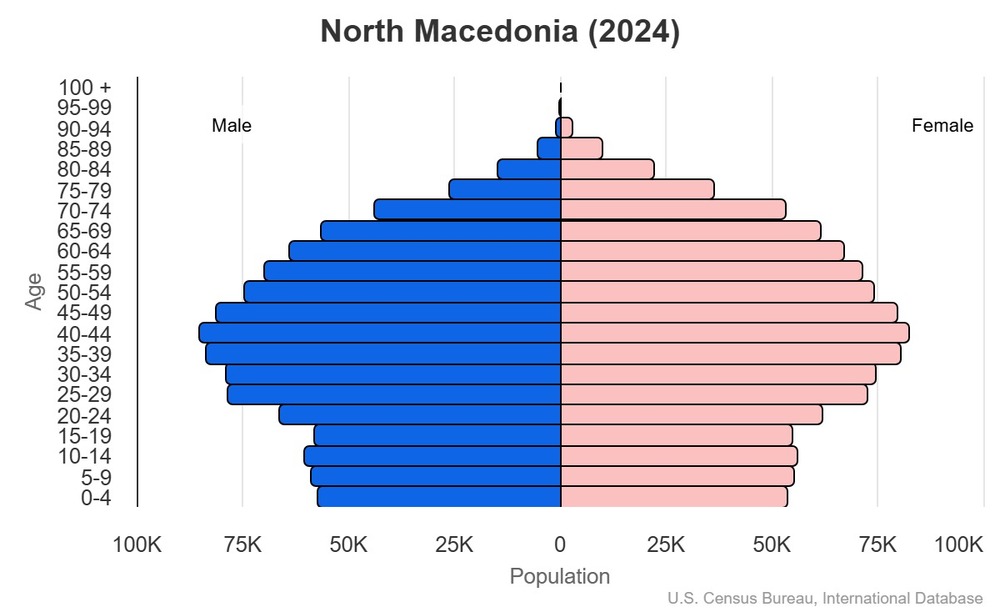
For additional information, please see the entry for Population pyramid on the Definitions and Notes page.
Geographic coordinates
Sex ratio
0-14 years: 1.07 male(s)/female
15-64 years: 1.03 male(s)/female
65 years and over: 0.79 male(s)/female
total population: 0.99 male(s)/female (2024 est.)
Natural hazards
Area - comparative
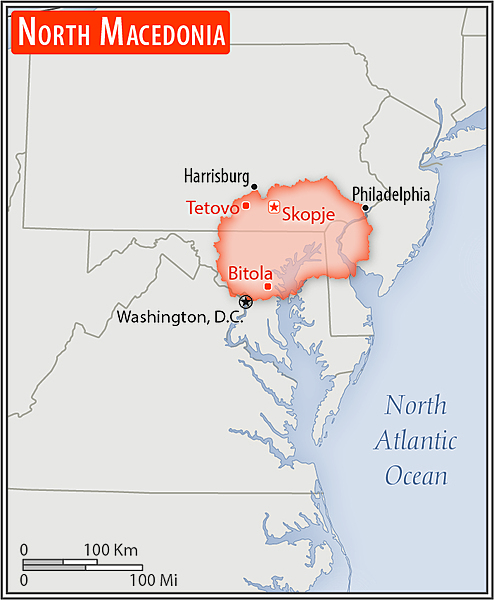
slightly larger than Vermont; almost four times the size of Delaware
Background
North Macedonia gained its independence peacefully from Yugoslavia in 1991 under the name of "Macedonia." Greece objected to the new country’s name, insisting it implied territorial pretensions to the northern Greek province of Macedonia, and democratic backsliding for several years stalled North Macedonia's movement toward Euro-Atlantic integration. Immediately after Macedonia declared independence, Greece sought to block its efforts to gain UN membership if the name "Macedonia" was used. The country was eventually admitted to the UN in 1993 as "The former Yugoslav Republic of Macedonia," and at the same time it agreed to UN-sponsored negotiations on the name dispute. In 1995, Greece lifted a 20-month trade embargo and the two countries agreed to normalize relations, but the issue of the name remained unresolved amid ongoing negotiations. As an interim measure, the US and over 130 other nations recognized Macedonia by its constitutional name, Republic of Macedonia.
Ethnic Albanian grievances over perceived political and economic inequities escalated into an armed conflict in 2001 that eventually led to the internationally brokered Ohrid Framework Agreement, which ended the fighting and established guidelines for constitutional amendments and new laws that enhanced the rights of minorities. In 2018, the government adopted a new law on languages, which elevated the Albanian language to an official language at the national level and kept the Macedonian language as the sole official language in international relations, but ties between ethnic Macedonians and ethnic Albanians remain complicated.
In 2018, Macedonia and Greece signed the Prespa Agreement whereby Macedonia agreed to change its name to North Macedonia, and the agreement went in to force on 12 February 2019. North Macedonia joined NATO in 2020 after amending its constitution as agreed and opened EU accession talks in 2022 after a two-year veto by Bulgaria over identity, language, and historical disputes. The 2014 legislative and presidential election triggered a political crisis that lasted almost three years and escalated in 2015 when the opposition party began releasing wiretapped material revealing alleged widespread government corruption and abuse. The country still faces challenges, including fully implementing reforms to overcome years of democratic backsliding, stimulating economic growth and development, and fighting organized crime and corruption.
Environmental issues
International environmental agreements
signed, but not ratified: none of the selected agreements
Military expenditures
1.9% of GDP (2024 est.)
1.7% of GDP (2023 est.)
1.6% of GDP (2022 est.)
1.5% of GDP (2021 est.)
Population below poverty line
note: % of population with income below national poverty line
Household income or consumption by percentage share
highest 10%: 22.9% (2019 est.)
note: % share of income accruing to lowest and highest 10% of population
Exports - commodities
note: top five export commodities based on value in dollars
Exports - partners
note: top five export partners based on percentage share of exports
Administrative divisions
*the Greater Skopje area is composed of 10 municipalities: Aerodrom, Butel, Centar, Chair, Gazi Baba, Gjorce Petrov, Karposh, Kisela Voda, Saraj, and Shuto Orizari
Agricultural products
note: top ten agricultural products based on tonnage
Military and security forces
note: the Police of Macedonia maintain internal security, including migration and border enforcement, and report to the Ministry of the Interior
Budget
expenditures: $5.514 billion (2023 est.)
note: central government revenues (excluding grants) and expenditures converted to US dollars at average official exchange rate for year indicated
Capital
geographic coordinates: 42 00 N, 21 26 E
time difference: UTC+1 (6 hours ahead of Washington, DC, during Standard Time)
daylight saving time: +1hr, begins last Sunday in March; ends last Sunday in October
etymology: the name is of Illyrian or Macedonian origin, and the meaning is unclear; derives from Scupi, its name during the Roman era
Imports - commodities
note: top five import commodities based on value in dollars
Climate
Coastline
Constitution
amendment process: proposed by the president of the republic, by the government, by at least 30 members of the Assembly, or by petition of at least 150,000 citizens; final approval requires a two-thirds majority vote by the Assembly
Exchange rates
Exchange rates:
56.873 (2024 est.)
56.947 (2023 est.)
58.574 (2022 est.)
52.102 (2021 est.)
54.144 (2020 est.)
Executive branch
head of government: Prime Minister Hristijan MICKOSKI (since 23 June 2024)
cabinet: Council of Ministers elected by the Assembly by simple majority vote
election/appointment process: president directly elected using a modified 2-round system; a candidate can only be elected in the first round with an absolute majority from all registered voters; in the second round, voter turnout must be at least 40% for the result to be valid; president elected for a 5-year term (eligible for a second term); following legislative elections, the Assembly usually elects the leader of the majority party or majority coalition as prime minister
most recent election date: 24 April and 8 May 2024
election results:
2024: Hristijan MICKOSKI elected prime minister; Assembly vote - 77 for, 22 against
2024: Gordana SILJANOVSKA-DAVKOVA elected president in the second round; percent of vote - Gordana SILJANOVSKA-DAVKOVA (VMRO-DPMNE) 69%, Stevo PENDAROVSKI (SDSM) 31%
2024: Talat XHAFERI elected caretaker prime minister; Assembly vote - 65 for (opposition boycott)
2022: Dimitar KOVACEVSKI elected prime minister; Assembly vote - NA
expected date of next election: 2029
Flag
meaning: the red and yellow colors have long been associated with Macedonia
Independence
Industries
Judicial branch
judge selection and term of office: Supreme Court judges nominated by the Judicial Council, a 7-member body of legal professionals, and appointed by the Assembly; judge tenure NA; Constitutional Court judges appointed by the Assembly for nonrenewable, 9-year terms
subordinate courts: Courts of Appeal; Basic Courts
Land boundaries
border countries (5): Albania 181 km; Bulgaria 162 km; Greece 234 km; Kosovo 160 km; Serbia 101 km
Land use
arable land: 16.5% (2023 est.)
permanent crops: 1.6% (2023 est.)
permanent pasture: 31.5% (2023 est.)
forest: 40.9% (2023 est.)
other: 9.5% (2023 est.)
Legal system
Legislative branch
legislative structure: unicameral
number of seats: 123 (all directly elected)
electoral system: mixed system
scope of elections: full renewal
term in office: 4 years
most recent election date: 5/8/2024
parties elected and seats per party: Coalition "Your Macedonia" (led by VMRO-DPMNE) (58); Coalition "European Front" (led by the Democratic Union for Integration – DUI) (18); Coalition "For a European Future" (led by the Social Democratic Union of Macedonia – SDSM) (18); Coalition VLEN (14); ZNAM (Movement "I know": For our Macedonia) (6); The Left (Levica) (6)
percentage of women in chamber: 39.2%
expected date of next election: May 2028
Literacy
Maritime claims
International organization participation
note: North Macedonia is an EU candidate country whose satisfactory completion of accession criteria is required before being granted full EU membership
National holiday
Nationality
adjective: Macedonian
Natural resources
Geography - note
Economic overview
upper-middle-income European economy; GDP growth driven by private consumption, public infrastructure investments, and wage growth; stalled progress on EU accession; public debt rising due to high pensions, wages, and interest payments; structural challenges of emigration, low productivity growth, and governance
Political parties
Alternative (Alternativa) or AAA
Besa Movement or BESA
Citizen Option for Macedonia or GROM
Democratic Alliance or DS
Democratic Movement or LD
Democratic Party of Albanians or PDSH
Democratic Party of Serbs or DPSM
Democratic Renewal of Macedonia or DOM
Democratic Union for Integration or BDI
European Democratic Party or PDE
Internal Macedonian Revolutionary Organization - Democratic Party for Macedonian National Unity or VMRO-DPMNE
Internal Macedonian Revolutionary Organization - People's Party or VMRO-NP
Liberal Democratic Party or LDP
New Social-Democratic Party or NSDP
Social Democratic Union of Macedonia or SDSM
Socialist Party of Macedonia or SPM
Srpska Stranka in Macedonia or SSM
The Left (Levica)
The People Movement or LP
Turkish Democratic Party or TDP
Turkish Movement Party or THP
We Can! (coalition includes SDSM/BESA/VMRO-NP, DPT, LDP)
Railways
Suffrage
Terrain
Government type
Country name
conventional short form: North Macedonia
local long form: Republika Severna Makedonija
local short form: Severna Makedonija
former: Democratic Federal Macedonia, People's Republic of Macedonia, Socialist Republic of Macedonia, Republic of Macedonia
etymology: the name derives from the ancient kingdom of Macedon (7th to 2nd centuries B.C.), whose name origin is unclear; it may derive from the mythological Macedon, the son of the Greek god Zeus; alternatively, it may come from the Greek word makednos, meaning "tail," or the Illyrian word maketia, meaning "cattle"
Location
Map references
Irrigated land
Diplomatic representation in the US
chancery: 2129 Wyoming Avenue NW, Washington, DC 20008
telephone: [1] (202) 667-0501
FAX: [1] (202) 667-2104
email address and website:
washington@mfa.gov.mk
United States (mfa.gov.mk)
consulate(s) general: Chicago, Detroit, New York
Internet users
Internet country code
Refugees and internally displaced persons
stateless persons: 159 (2024 est.)
GDP (official exchange rate)
note: data in current dollars at official exchange rate
Total renewable water resources
School life expectancy (primary to tertiary education)
male: 14 years (2022 est.)
female: 15 years (2022 est.)
Urbanization
rate of urbanization: 0.61% annual rate of change (2020-25 est.)
Broadcast media
Drinking water source
urban: 98.1% of population (2022 est.)
rural: 97.4% of population (2022 est.)
total: 97.8% of population (2022 est.)
unimproved:
urban: 1.9% of population (2022 est.)
rural: 2.6% of population (2022 est.)
total: 2.2% of population (2022 est.)
National anthem(s)
lyrics/music: Vlado MALESKI/Todor SKALOVSKI
history: written in 1943 and adopted in 1991, the song previously served as the anthem of the Socialist Republic of Macedonia, when it was part of Yugoslavia
Major urban areas - population
International law organization participation
Physician density
Hospital bed density
National symbol(s)
Mother's mean age at first birth
GDP - composition, by end use
government consumption: 16.8% (2024 est.)
investment in fixed capital: 28.4% (2024 est.)
investment in inventories: 0% (2024 est.)
exports of goods and services: 62.7% (2024 est.)
imports of goods and services: -75.8% (2024 est.)
note: figures may not total 100% due to rounding or gaps in data collection
Citizenship
citizenship by descent only: at least one parent must be a citizen of North Macedonia
dual citizenship recognized: no
residency requirement for naturalization: 8 years
Population distribution
Electricity access
Civil aircraft registration country code prefix
Sanitation facility access
urban: 100% of population (2022 est.)
rural: 98.6% of population (2022 est.)
total: 99.4% of population (2022 est.)
unimproved:
urban: 0% of population (2022 est.)
rural: 1.4% of population (2022 est.)
total: 0.6% of population (2022 est.)
Ethnic groups
note: data represent total resident population; Romani populations are usually underestimated in official statistics and may represent 6.5–13% of North Macedonia’s population
Religions
Languages
major-language sample(s):
Книга на Светски Факти, неопходен извор на основни информации. (Macedonian)
The World Factbook, the indispensable source for basic information.
note: data represent mother tongue; minority languages are co-official with Macedonian in municipalities where at least 20% of the population are speakers, with Albanian co-official in Tetovo, Brvenica, Vrapciste, and other municipalities, Turkish in Centar Zupa and Plasnica, Romani in Suto Orizari, Aromanian in Krusevo, Serbian in Cucer Sandevo
Imports - partners
note: top five import partners based on percentage share of imports
Elevation
lowest point: Vardar River 50 m
mean elevation: 741 m
Health expenditure
12.4% of national budget (2022 est.)
Military - note
Military and security service personnel strengths
Military equipment inventories and acquisitions
Terrorist group(s)
note: details about the history, aims, leadership, organization, areas of operation, tactics, targets, weapons, size, and sources of support of the group(s) appear(s) in the Terrorism reference guide
Total water withdrawal
industrial: 31.54 million cubic meters (2022 est.)
agricultural: 139 million cubic meters (2022 est.)
Waste and recycling
percent of municipal solid waste recycled: 4.9% (2022 est.)
Average household expenditures
on alcohol and tobacco: 4.8% of household expenditures (2023 est.)
Major watersheds (area sq km)
National heritage
selected World Heritage Site locales: Natural and Cultural Heritage of the Ohrid Region; Ancient and Primeval Beech Forests of the Carpathians
Child marriage
women married by age 18: 7.5% (2019)
Coal
consumption: 5.344 million metric tons (2023 est.)
exports: 58,000 metric tons (2023 est.)
imports: 41,000 metric tons (2023 est.)
proven reserves: 332 million metric tons (2023 est.)
Electricity generation sources
solar: 4.6% of total installed capacity (2023 est.)
wind: 2.3% of total installed capacity (2023 est.)
hydroelectricity: 24% of total installed capacity (2023 est.)
biomass and waste: 0.8% of total installed capacity (2023 est.)
Natural gas
imports: 347.981 million cubic meters (2023 est.)
Petroleum
Gross reproduction rate
Currently married women (ages 15-49)
Remittances
2.9% of GDP (2023 est.)
3.3% of GDP (2022 est.)
note: personal transfers and compensation between resident and non-resident individuals/households/entities
National color(s)
Particulate matter emissions
Labor force
note: number of people ages 15 or older who are employed or seeking work
Youth unemployment rate (ages 15-24)
male: 29.2% (2024 est.)
female: 32.3% (2024 est.)
note: % of labor force ages 15-24 seeking employment
Net migration rate
Median age
male: 39.4 years
female: 41.6 years
Debt - external
note: present value of external debt in current US dollars
Maternal mortality ratio
Reserves of foreign exchange and gold
$5.015 billion (2023 est.)
$4.12 billion (2022 est.)
note: holdings of gold (year-end prices)/foreign exchange/special drawing rights in current dollars
Public debt
note: official data from Ministry of Finance; data cover central government debt; this data excludes debt instruments issued (or owned) by government entities other than the treasury; includes treasury debt held by foreign entitites; excludes debt issued by sub-national entities; there are no debt instruments sold for social funds
Total fertility rate
Unemployment rate
13.2% (2023 est.)
14.5% (2022 est.)
note: % of labor force seeking employment
Carbon dioxide emissions
from coal and metallurgical coke: 3.014 million metric tonnes of CO2 (2023 est.)
from petroleum and other liquids: 3.682 million metric tonnes of CO2 (2023 est.)
from consumed natural gas: 673,000 metric tonnes of CO2 (2023 est.)
Area
land: 25,433 sq km
water: 280 sq km
Taxes and other revenues
note: central government tax revenue as a % of GDP
Real GDP (purchasing power parity)
$42.668 billion (2023 est.)
$41.801 billion (2022 est.)
note: data in 2021 dollars
Airports
Infant mortality rate
male: 7.9 deaths/1,000 live births
female: 6 deaths/1,000 live births
Gini Index coefficient - distribution of family income
note: index (0-100) of income distribution; higher values represent greater inequality
Inflation rate (consumer prices)
9.4% (2023 est.)
14.2% (2022 est.)
note: annual % change based on consumer prices
Current account balance
$56.573 million (2023 est.)
-$868.965 million (2022 est.)
note: balance of payments - net trade and primary/secondary income in current dollars
Real GDP per capita
$23,300 (2023 est.)
$22,800 (2022 est.)
note: data in 2021 dollars
Broadband - fixed subscriptions
subscriptions per 100 inhabitants: 28 (2022 est.)
Obesity - adult prevalence rate
Energy consumption per capita
Death rate
Birth rate
Electricity
consumption: 5.896 billion kWh (2023 est.)
exports: 7.081 billion kWh (2023 est.)
imports: 7.232 billion kWh (2023 est.)
transmission/distribution losses: 993.662 million kWh (2023 est.)
Children under the age of 5 years underweight
Imports
$12.748 billion (2023 est.)
$13.009 billion (2022 est.)
note: balance of payments - imports of goods and services in current dollars
Exports
$10.691 billion (2023 est.)
$10.123 billion (2022 est.)
note: balance of payments - exports of goods and services in current dollars
Heliports
Alcohol consumption per capita
beer: 1.93 liters of pure alcohol (2019 est.)
wine: 1.03 liters of pure alcohol (2019 est.)
spirits: 0.9 liters of pure alcohol (2019 est.)
other alcohols: 0.03 liters of pure alcohol (2019 est.)
Life expectancy at birth
male: 75.3 years
female: 79.6 years
Real GDP growth rate
2.1% (2023 est.)
2.8% (2022 est.)
note: annual GDP % growth based on constant local currency
Industrial production growth rate
note: annual % change in industrial value added based on constant local currency
GDP - composition, by sector of origin
industry: 22.7% (2024 est.)
services: 59.2% (2024 est.)
note: figures may not total 100% due to non-allocated consumption not captured in sector-reported data
Population growth rate
Military service age and obligation
note: as of 2024, women made up about 10% of the military's full-time personnel
Dependency ratios
youth dependency ratio: 23.3 (2025 est.)
elderly dependency ratio: 23.6 (2025 est.)
potential support ratio: 4.2 (2025 est.)
Population
male: 1,065,634
female: 1,071,922
Telephones - mobile cellular
subscriptions per 100 inhabitants: 108 (2024 est.)
Telephones - fixed lines
subscriptions per 100 inhabitants: 25 (2024 est.)